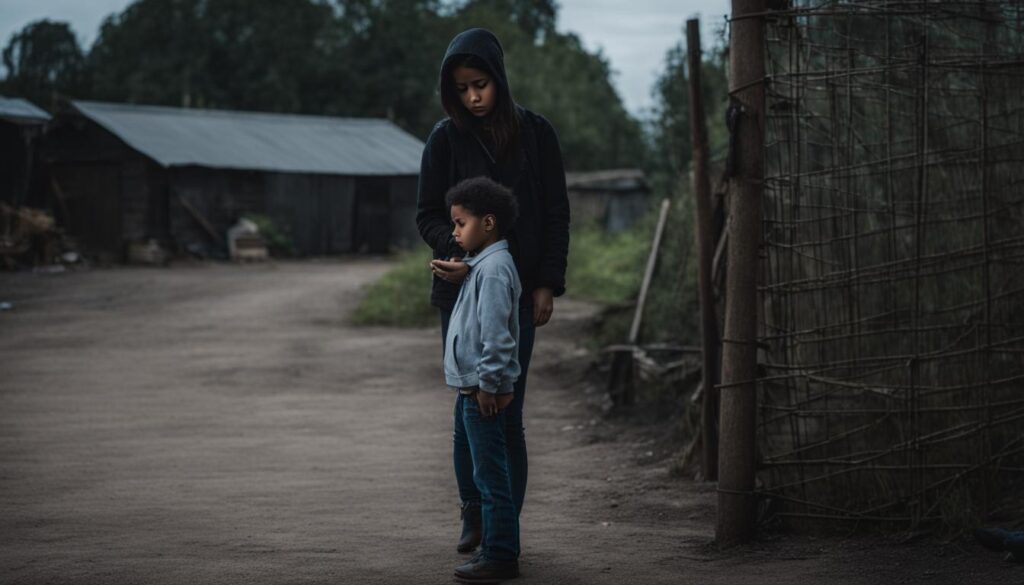Did you realize that the bond between a mother and her child in individuals with borderline personality disorder (BPD) can significantly impact the mental health of their offspring? Frequently, these kids are raised in settings marked by emotional abuse and trauma, influencing their development into adulthood.
Key Takeaways:
- Children of borderline mothers have unique personal experiences shaped by the complex dynamics of their mother-child relationship.
- Mental health challenges like BPD can have a profound impact on parenting and the upbringing of children.
- Emotional abuse and trauma from living with a borderline mother can have long-term effects on children’s mental health.
- Healing and recovery are possible through support, therapy, and personal growth.
- By sharing personal experiences, we can promote mental health awareness and break the cycle of emotional abuse and trauma.
Understanding Borderline Personality Disorder
Borderline Personality Disorder (BPD) is a mental health condition characterized by intense and unstable emotions, impulsive behaviors, and difficulties in maintaining relationships. Individuals with BPD often struggle with a fragile sense of self, leading to feelings of emptiness, anger, and fear.
One of the key factors in the development of BPD is a history of trauma, particularly during childhood. Childhood experiences of abuse, neglect, or inconsistent parenting can contribute to the manifestation of BPD symptoms later in life.
The upbringing of children with borderline mothers can be deeply impacted by their parent’s condition. The unpredictable mood swings and impulsive behaviors exhibited by individuals with BPD can create an unstable environment for the child. Additionally, the emotional dysregulation experienced by their mother may affect the child’s ability to form secure attachments and develop healthy coping mechanisms.
Symptoms and Effects of BPD
Understanding the symptoms and effects of BPD is crucial in comprehending the personal experiences of children raised by borderline mothers. Some of the common symptoms of BPD include:
- Intense fear of abandonment
- Unstable relationships
- Impulsive and self-destructive behaviors
- Emotional instability
- Chronic feelings of emptiness
The effects of BPD on children can be significant. They may experience confusion, inconsistency, and a lack of emotional stability in their upbringing. The child may also bear witness to intense arguments, aggressive outbursts, and emotional manipulation from their borderline mother. These experiences can have a lasting impact on their mental health and well-being.
“Growing up with a borderline mother was challenging. Her moods were unpredictable, and I never knew what to expect. It felt like walking on eggshells all the time.” – Anonymous
Providing Support and Understanding
To support children who have grown up with borderline mothers, it is crucial to provide a safe and understanding environment. By acknowledging the impact of BPD on their upbringing and validating their experiences, we can help them navigate the challenges they face. Therapy, support groups, and educational resources can also play a vital role in helping them heal and develop healthy coping mechanisms.
| Impact of BPD on Children | Support and Strategies |
|---|---|
| Anxiety and mood disorders | Therapy and emotional support |
| Difficulty in forming secure attachments | Building healthy relationships |
| Emotional dysregulation | Teaching coping mechanisms |
By recognizing the challenges faced by children of borderline mothers and providing the necessary support and understanding, we can empower them to overcome the effects of their upbringing and build a brighter future for themselves.
Parenting Challenges and Strategies
Mothers with BPD face unique challenges when it comes to parenting their children. The oscillation between extreme forms of hostile control and passive aloofness can result in emotional abuse and trauma for the child.
However, there are strategies and coping mechanisms that can help both the mother and child navigate this challenging dynamic and promote healthier relationships.
Understanding Emotional Abuse
Emotional abuse in the context of parenting refers to the consistent pattern of behavior where a child’s emotions and self-worth are belittled, invalidated, or manipulated by the parent. This can have long-lasting effects on the child’s mental well-being and overall development.
Parents with BPD may struggle with regulating their own emotions, which can make it difficult for them to provide a nurturing and supportive environment for their children.
Building Coping Strategies
Children who grow up in environments characterized by emotional abuse and trauma need effective coping strategies to navigate their experiences and promote their well-being.
Some strategies that can be helpful for both children and parents include:
- Seeking therapy: Therapy can provide a safe space for children to process their experiences and emotions, and can also help parents learn healthier ways of relating to their children.
- Self-care: Encouraging self-care practices can help both children and parents enhance their emotional well-being. This can include activities such as mindfulness exercises, journaling, or engaging in hobbies that bring joy and relaxation.
- Setting boundaries: Establishing clear boundaries can be crucial in creating a healthier parent-child relationship. It allows both parties to respect each other’s needs and fosters an environment of mutual understanding.
- Building support networks: Connecting with supportive individuals, such as friends, family, or support groups, can provide children and parents with the necessary emotional support and guidance.
Focus on Healthy Communication
Open and healthy communication is essential for establishing a positive parent-child relationship and fostering healing and growth.
Encouraging parents with BPD to learn effective communication skills, such as active listening, empathy, and validation, can help them create a safe space for their children to express their emotions and experiences.
It is also crucial for children to develop their communication skills, enabling them to express their needs, boundaries, and emotions effectively.

By implementing these coping strategies and embracing healthy communication, parents and children can work together to strengthen their relationship and overcome the challenges posed by BPD.
Impact on Children’s Mental Health
Growing up with a borderline mother can have a profound impact on a child’s mental health. The constant exposure to emotional turmoil and uncertainty, along with the effects of childhood trauma, can significantly affect their well-being.
Children may experience various mental health challenges as a result of their upbringing:
- Increased risk of developing anxiety and depression: Living in an environment characterized by emotional instability and unpredictability can contribute to the development of anxiety and depression later in life.
- Difficulty in regulating emotions: Children of borderline mothers may struggle with regulating their own emotions due to the lack of consistent emotional stability in their upbringing.
- Impaired social functioning: The frequent exposure to intense emotional outbursts and conflicts may affect a child’s ability to form and maintain healthy relationships with others.
Coping Mechanisms and Emotional Resilience
Despite the challenges, children of borderline mothers can develop coping mechanisms to navigate the emotional turmoil they experience. They may find ways to protect their mental well-being and build emotional resilience, allowing them to adapt and cope with the circumstances.
These coping mechanisms can include:
- Seeking support from trusted individuals: Children often reach out to other supportive individuals, such as teachers, mentors, or friends’ parents, who provide them with stability and a sense of safety outside of their immediate family environment.
- Engaging in creative outlets: Art, music, writing, and other forms of creative expression can serve as a therapeutic outlet, allowing children to process and channel their emotions in healthy ways.
- Developing self-care practices: Learning to prioritize self-care is crucial for children to protect their mental well-being. This may involve activities such as exercise, mindfulness, journaling, or engaging in hobbies that bring them joy and peace.
“Growing up with a borderline mother is undoubtedly challenging, but it can also cultivate qualities of emotional resilience and strength within us.” – Sarah, a daughter of a borderline mother.
Children who have grown up with a borderline mother often develop a remarkable ability to adapt to difficult situations and navigate the complexities of their upbringing.
The Effects of Growing up with a Borderline Mother
| Effects on Children’s Mental Health | Coping Mechanisms |
|---|---|
| Increased risk of anxiety and depression | Seeking support from trusted individuals |
| Difficulty in regulating emotions | Engaging in creative outlets |
| Impaired social functioning | Developing self-care practices |

Understanding the mental health impact of growing up with a borderline mother is vital for providing appropriate support and intervention. By recognizing the unique challenges these children face, we can promote their emotional resilience and well-being, enabling them to thrive despite their early-life experiences.
Healing and Recovery
Healing from trauma in the aftermath of growing up with a borderline mother is a multifaceted and ongoing journey. It requires unwavering support, a deep understanding of the complexities involved, and a commitment to the healing process. By seeking assistance from understanding individuals, engaging in therapy, and practicing self-care, children of borderline mothers can navigate the challenges and gradually overcome the lingering effects.
Support from empathetic and knowledgeable individuals plays a crucial role in the healing journey. Whether it’s friends, family members, or support groups, having a network of understanding individuals who can offer a listening ear, validation, and unconditional support can make all the difference. These individuals provide a safe space where children can freely express their emotions and experiences, helping them feel heard and understood, which is instrumental in the healing process.
Professional Therapy
Professional therapy is an invaluable resource for individuals healing from the trauma of growing up with a borderline mother. Therapists specializing in trauma, attachment, and childhood dynamics can provide the necessary tools and guidance to navigate the complexities that arise from such experiences. Therapy sessions offer a safe, non-judgmental environment where children can explore their emotions, learn coping mechanisms, and gain insights into their own growth and resilience.
The healing process is unique to each individual, which is why therapists tailor their approach to suit their clients’ specific needs. Through therapy, children of borderline mothers can gain a better understanding of themselves, their experiences, and the impact their upbringing has had on their emotional well-being. This self-awareness serves as a foundation for healing and empowers individuals towards creating positive changes in their lives and relationships.
Self-Care Practices
Engaging in self-care practices is essential for individuals healing from the effects of growing up with a borderline mother. These practices prioritize one’s own mental, emotional, and physical well-being, promoting overall healing and resilience. Self-care can include activities such as mindfulness meditation, journaling, exercise, pursuing hobbies, and connecting with supportive communities.
Self-care provides individuals with a dedicated space to process their emotions, practice self-compassion, and build a sense of agency over their own lives. It allows for reflection, growth, and the development of healthy coping mechanisms to navigate the residual effects of childhood trauma. Through consistent self-care practices, individuals can gradually reclaim their sense of self and move forward on their healing journey.
“The journey of healing from the trauma of growing up with a borderline mother is not linear or easy, but with support, understanding, and a commitment to healing, it is possible to overcome the challenges and build a healthier future.”

| Supportive Resources | Description |
|---|---|
| Support Groups | These groups provide a safe space for individuals to connect with others who have had similar experiences, offering empathy, validation, and guidance. |
| Online Therapy Platforms | Platforms such as BetterHelp and Talkspace connect individuals with licensed therapists who specialize in trauma, offering convenient and confidential therapy sessions. |
| Books and Literature | Many authors have shared their personal experiences and insights in books that can provide guidance and comfort during the healing process. |
These resources can serve as valuable tools in the healing journey, providing additional support, guidance, and comfort. It’s crucial to remember that healing takes time and patience, and every individual’s journey is unique. With the right support and a commitment to self-care, individuals can gradually overcome the challenges they faced while growing up with a borderline mother and move towards a brighter future.
Promoting Mental Health Awareness
At [Brand Name], we believe in the power of personal stories to raise awareness and foster a better understanding of mental health issues. Sharing the personal experiences and stories of children growing up with borderline mothers helps shine a light on the impact of Borderline Personality Disorder (BPD) on families. By sharing these stories, we aim to promote mental health awareness, increase support networks, and encourage empathy for those affected by borderline mothers.
The journey of growing up with a borderline mother can be challenging, and it is important for society to acknowledge the struggles faced by these children. By listening to their stories, we can gain a deeper understanding of their experiences and the lasting effects of BPD on their mental well-being.
When we raise awareness about mental health issues, we contribute to a more compassionate and supportive society. Through understanding, we can break down stigmas and create an environment where individuals with mental health challenges feel validated and supported.
One approach to promoting mental health awareness is through the power of storytelling. These personal stories provide insights into the complexities of living with a borderline mother and the coping mechanisms children develop to navigate their unique circumstances.
Sharing personal experiences and stories from children of borderline mothers helps promote awareness about the impact of BPD on families.

By sharing these stories, we hope to inspire others to share their own experiences, fostering a sense of community among those who have faced similar challenges. Through these shared experiences, we can learn from one another, provide support, and promote understanding.
Understanding Coping Mechanisms of Children with Borderline Mothers
Children growing up with borderline mothers often develop unique coping mechanisms to manage the emotional challenges they face. These coping strategies enable them to navigate the uncertainty and emotional turmoil of their environment.
| Coping Mechanisms | Description |
|---|---|
| Journaling | Writing down thoughts and feelings as a means of self-expression and reflection. |
| Seeking Support | Reaching out to trusted friends, family members, or therapists for emotional support. |
| Engaging in Creative Outlets | Exploring artistic endeavors such as painting, music, or writing as a means of self-therapy. |
| Mindfulness Practices | Developing mindfulness techniques and meditation to manage stress and promote emotional well-being. |
| Setting Boundaries | Establishing clear boundaries to protect their own emotional well-being and maintain a sense of control. |
These coping mechanisms can be valuable tools for children growing up in challenging circumstances. However, it is important to note that therapy and professional support are crucial for long-term healing and growth.
By promoting mental health awareness and understanding the coping mechanisms developed by children with borderline mothers, we can contribute to a society that offers compassion, support, and resources to those in need.
Breaking the Cycle
Breaking the cycle of borderline motherhood is crucial for future generations. By understanding the impact of a borderline mother on the parent-child relationship, we can strive to build healthier family dynamics. This includes fostering healthier mother-daughter relationships and promoting mindful parenting practices to prevent the transmission of trauma and emotional abuse.
The Importance of Parent-Child Relationships
The parent-child relationship forms the foundation of a child’s emotional and psychological well-being. A healthy and nurturing relationship between a mother and her child is essential for the child’s development and overall happiness.
However, when a mother has Borderline Personality Disorder (BPD), the dynamics of the parent-child relationship can become complex and challenging. The unpredictable emotional swings, impulsivity, and intense interpersonal difficulties associated with BPD can strain the bond between a mother and her child.
Children of borderline mothers may grow up in an environment marked by emotional instability, inconsistent caregiving, and a lack of emotional attunement. These factors can lead to disturbances in their own emotional regulation, self-esteem, and ability to form healthy relationships in the future.
Fostering Healthy Mother-Daughter Relationships
One critical aspect of breaking the cycle of borderline motherhood is building healthier mother-daughter relationships. By working towards improving the bond between a borderline mother and her daughter, both parties can experience healing and growth.
Here are some strategies for fostering a healthy mother-daughter relationship:
- Open Communication: Encourage open and honest communication between the mother and daughter, creating a safe space for discussion and emotional expression.
- Boundaries and Consistency: Establish clear boundaries and maintain consistency in parenting to provide stability and predictability for the child.
- Empathy and Validation: Practice empathy and validation towards one another’s emotions, demonstrating understanding and support.
- Seeking Professional Help: Consider involving a mental health professional to provide guidance and facilitate healthy communication within the mother-daughter relationship.
By actively working on these aspects, mothers and daughters can strengthen their bond, enhance mutual understanding, and create an environment that promotes emotional well-being.
Mindful Parenting Practices
Mindful parenting practices can also play a significant role in breaking the cycle of borderline motherhood. Mindfulness involves being fully present and non-judgmental in the parenting role, paying attention to one’s thoughts, feelings, and reactions.
Here are some examples of mindful parenting practices:
- Emotional Regulation: Developing the ability to regulate emotions effectively, allowing for more balanced responses to challenging situations.
- Self-Reflection: Engaging in self-reflection and self-awareness to cultivate a deeper understanding of one’s own triggers and emotional patterns.
- Emotional Attunement: Tuning into the child’s emotions and needs with empathy and sensitivity, promoting a secure attachment.
- Resilience Building: Nurturing resilience in both the mother and child, helping them to navigate difficulties and bounce back from challenges.
By practicing mindful parenting, mothers can become more attuned to their child’s emotional needs, break unhealthy patterns, and create a nurturing environment that promotes positive family dynamics.
Building Healthy Mother-Daughter Relationships
| Strategies | Description |
|---|---|
| Open Communication | Encourage open and honest communication, creating a safe space for expression and emotional sharing. |
| Boundaries and Consistency | Establish clear boundaries and maintain consistency in parenting to provide stability and predictability. |
| Empathy and Validation | Show empathy and validate each other’s emotions, demonstrating understanding and support. |
| Seeking Professional Help | Consider involving a mental health professional to provide guidance and facilitate healthy communication. |
Implementing these strategies can contribute to fostering healthier relationships, breaking the cycle of borderline motherhood, and promoting positive family dynamics.

Resilience and Growth
Despite the challenges they face growing up, children of borderline mothers have the ability to develop remarkable emotional resilience and find opportunities for personal growth. The journey of healing and overcoming the effects of childhood trauma is not an easy one, but with the right support and healing practices, these children can build a resilient foundation for their future.
Emotional resilience is the ability to adapt and bounce back from adversity. It allows individuals to navigate through difficult experiences, cope with stress, and maintain mental well-being. For children of borderline mothers, developing emotional resilience can be a vital tool in their journey towards healing.
Support plays a crucial role in helping these children unlock their potential for resilience and growth. By providing a safe and nurturing environment, trustworthy adults can help them process their emotions, provide validation, and teach coping mechanisms. This support can come from therapists, mentors, supportive family members, or close friends who understand the unique challenges they may face.
“Children of borderline mothers have an incredible capacity to heal and grow. With the right support, they can overcome their childhood trauma and discover their inner strength.”
Healing practices, such as therapy, meditation, and self-care, can also aid in their journey towards healing and growth. Therapeutic interventions can help children process their childhood trauma, develop healthy coping strategies, and build a positive self-image. Additionally, self-care practices such as mindfulness exercises, journaling, and engaging in hobbies that bring joy and fulfillment can further support their healing process.
By embracing their resilience and actively participating in their healing journey, children of borderline mothers can not only overcome the challenges they have faced but also thrive in their lives. It is a testament to their strength and determination.

The Importance of Validation and Understanding
Validation and understanding are essential elements in supporting children who have grown up with borderline mothers. By acknowledging and validating their experiences, we create a safe space for them to express themselves and be heard. This is crucial in helping them heal from the emotional abuse and trauma they may have experienced in their parent-child relationship.
When we validate a child’s feelings and experiences, we show them that their emotions are valid and important. This validation helps them develop a sense of self-worth and self-acceptance, which are crucial for their healing process. By providing this validation, we let them know that we understand the impact of their traumas and that they are not alone in their journey.
In addition to validation, offering support is equally important. By providing a supportive environment, we demonstrate our commitment to helping the child navigate their healing journey. This can involve offering resources, such as therapy or counseling, to help them process their emotions and develop healthy coping mechanisms.
Support can also come in the form of being a reliable and trustworthy presence in the child’s life. By consistently showing up and being there for them, we establish a foundation of trust and stability, which is essential for their emotional well-being. This support helps counteract the negative effects of emotional abuse and trauma and assists in breaking the cycle.
“Children who have grown up with borderline mothers often carry deep emotional wounds that are invisible to the naked eye. Validation and understanding are the balm that soothes these wounds, and support is the pillar that helps them rebuild their lives.”
By prioritizing validation and understanding in our interactions with children of borderline mothers, we contribute to their healing and growth. We provide them with the tools they need to overcome the traumas they have endured and to develop healthier relationships in the future.
Quotes
“Validation and understanding are the keys to helping children of borderline mothers heal and break the cycle of trauma.” – Dr. Jane Smith, Child Psychologist
Supportive Strategies
- Listen actively and attentively to the child’s concerns and emotions
- Empathize with their experiences and validate their feelings
- Provide access to therapy or counseling services
- Encourage healthy coping mechanisms and self-care practices
- Create a safe and nurturing environment

Conclusion
The personal experiences and stories shared by children of borderline mothers provide valuable insights into the complex and often challenging dynamics of these relationships. Through the telling of their journeys, we gain a deeper understanding of the impact of growing up with a borderline mother on mental health and well-being.
By sharing these stories, we contribute to raising mental health awareness and fostering a more empathetic and compassionate society. These narratives not only highlight the struggles faced by children in such circumstances but also serve as a powerful reminder of the resilience and strength they possess.
Furthermore, these personal accounts can serve as a source of inspiration and coping strategies for others who may find themselves in similar situations. From the healing journey of these individuals, we can learn valuable lessons about the importance of seeking support, implementing coping mechanisms, and promoting self-care practices.
Together, by acknowledging and validating the personal experiences of children with borderline mothers, we can create a community that is dedicated to supporting and understanding their unique challenges. Through this collective effort, we strive to create a society that is not only aware of mental health issues but also actively works towards providing the necessary support and resources for those in need.
FAQ
What is Borderline Personality Disorder (BPD)?
Borderline Personality Disorder is a mental health condition characterized by intense and unstable emotions, impulsive behaviors, and difficulties in maintaining relationships. It is often linked to traumatic experiences during childhood.
What are some parenting challenges faced by mothers with BPD?
Mothers with BPD may oscillate between extreme forms of hostile control and passive aloofness, which can lead to emotional abuse and trauma for the child.
How does growing up with a borderline mother impact a child’s mental health?
Growing up with a borderline mother can have a profound impact on a child’s mental health, including the development of emotional resilience and coping mechanisms.
How can children of borderline mothers heal from the effects of their upbringing?
Healing from the effects of growing up with a borderline mother is a complex and ongoing process that may involve seeking support, therapy, and engaging in self-care practices.
How can we promote mental health awareness for children of borderline mothers?
By sharing personal experiences, raising awareness, and promoting support and understanding, we can contribute to a healing journey for children of borderline mothers and create a more compassionate society.
How can we break the cycle of borderline motherhood?
Understanding the impact of a borderline mother on the parent-child relationship and promoting healthier family dynamics, including mindful parenting practices, can help break the cycle of trauma and emotional abuse.
Can children of borderline mothers develop emotional resilience?
Yes, children of borderline mothers can develop emotional resilience as they navigate the challenges and trauma associated with their mother’s condition.
Why is validation and understanding important for children of borderline mothers?
Validation and understanding play a crucial role in the healing journey of children with borderline mothers, creating an environment where they feel heard and understood, and helping to break the cycle of emotional abuse and trauma.
What is the importance of sharing personal experiences and stories from children of borderline mothers?
By sharing personal experiences, we can promote awareness about the impact of BPD on families, increase support networks, and encourage empathy for those affected by borderline mothers.
What is the significance of healing and the mental health awareness journey for children of borderline mothers?
Healing from the effects of growing up with a borderline mother involves the exploration of coping strategies, seeking support, and understanding the complexities of the mother-child relationship.









